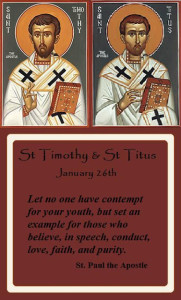
Saint Timothy & Saint Titus
Image Courtesy: Hilltop Farm
(CNA) Today the Church celebrates the liturgical memorial of Saint’s Timothy and Titus, close companions of the Apostle Paul and Bishops of the Catholic Church in its earliest days. Both men received letters from Saint Paul which are included in the New Testament.
Pope Emeritus Benedict XVI spoke of these early Bishops during his general audience on the 16 December, 2006 noting, “their readiness to take on various offices” in far from “easy” circumstances. Both Saint’s “teach us to serve the Gospel with generosity realizing that this also entails a service to the Church herself.”
The Son of a Jewish mother and a non-Jewish father, Timothy from Lystra (today known as Turkey) his mother Eunice and his grandmother Lois are known to have joined the Church and Timothy himself is described as a student of Sacred Scripture from his youth.
Following Paul’s visit to Timothy’s home around the year 51 the young man joined the apostle and accompanied him in his travels. After religious strife forced Paul to leave the City of Berea, Timothy remained to help the local Church. Paul later sent him to Thessalonica to help the Church during a period of persecution.
Paul and Timothy met up again in Corinth —1 Thessalonians 3:6 and Timothy eventually journey to Macedonia on Paul’s behalf. Problems in the Corinthian Church brought Timothy back for a time after which he joined Paul and accompanied the apostle in subsequent travels.
Like Paul, Timothy endured a period of imprisonment in the course of his missionary work Hebrews 10:30-36 “For we know Him who said ‘Vengeance is mine, I will repay’ and again, ‘The Lord will judge his people.’ It is a fearful thing to fall into the hands of the living God but recall the former days when you were enlightened, you endured a hard struggle with sufferings, sometimes being publicly exposed to abuse and affliction and sometimes being partners with those so treated. For you had compassion on the prisoners and you joyfully accepted the plundering of your property, since you knew that you yourselves had a better possession and an abiding one. Therefore do not throw away your confidence which has a great reward. For you have need of endurance, so that you may do the will of God and receive what is promised.”
Hebrews 13:16-21 “Do not neglect to do good and to share what you have, for such sacrifices are pleasing to God. Obey your leaders and submit to them, for they are keeping watch over your souls as men who will have to give account. Let them do this joyfully and not sadly, for that would be of no advantage to you. Pray for us, for we are sure that we have a clear conscience, desiring to act honorably in all things. I urge you the more earnestly to do this in order that I may be restored to you sooner.
Benediction: Now may the God of peace who brought again from the dead our Lord Jesus, the Great Shepherd of the sheep, by the blood of the eternal covenant, equip you with everything good that you may do His will, working in you, that which is pleasing in His sight, through Jesus Christ, to whom be glory for ever and ever. Amen.”
Around the year, Timothy became the first Bishop of the Church of Ephesus. During that same year he received the first of two surviving letters from Saint Paul, the second written the next year, urges Timothy to visit St. Paul in Rome where he was imprisoned before his martyrdom.
Ancient sources state that Saint Timothy followed his mentor in dying as a martyr for the faith. In the year of 93 during his leadership of the Church of Ephesus, he took a stand against the worship of idols and was consequently killed by a mob.
In contrast, to Timothy’s Jewish heritage and student of the Sacred Scriptures from his youth, Saint Titus was born into a pagan family, studying Greek, philosophy and poetry during his early years but he pursued a life of virtue and purportedly had a prophetic dream that caused him to begin reading the Hebrew Scriptures.
According to tradition, Titus journeyed to Jerusalem and witnessed the preaching of Jesus, during the Lord’s ministry on earth. Only later however, after the conversion of Saint Paul and the beginning of his ministry, did Titus receive baptism from the apostle who called the pagan to convert his ‘true child in our common faith.’ —Titus 1:4
Saint Paul was not only Titus’ spiritual father but depended on his convert as an assistant and interpreter. Titus accompanied Paul to the Apostolic Council of Jerusalem during the year 51 and was later sent to the Corinthian Church on two occasions. After the end of Paul’s first imprisonment in Rome, the apostle ordained Titus as the Bishop of Crete.
Paul sent his only surviving letter to Titus around the year 64 giving instructions in pastoral ministry to his disciple as he prepared to meet up with him in the Greek City of Nicopolis. Titus evangelized the region of Dalmatia (modern day Croatia) before returning to Crete.
Saint Titus is credited with leading the Church of Crete well into his 90s, overturning paganism and promoting the faith through his prayers and ministry. Unlike Saint Timothy, Saint Titus was not martyred but died peacefully in old age.
Related: For Today’s Most Holy Scripture Readings for the Memorial of St. Timothy & St. Titus, Visit: -USCCB